Where To Find Florida Property Records?
Florida property records will be available from the county clerk.
 Written by Background Check Repair
Written by Background Check Repair
Criminal Records | April 29, 2024
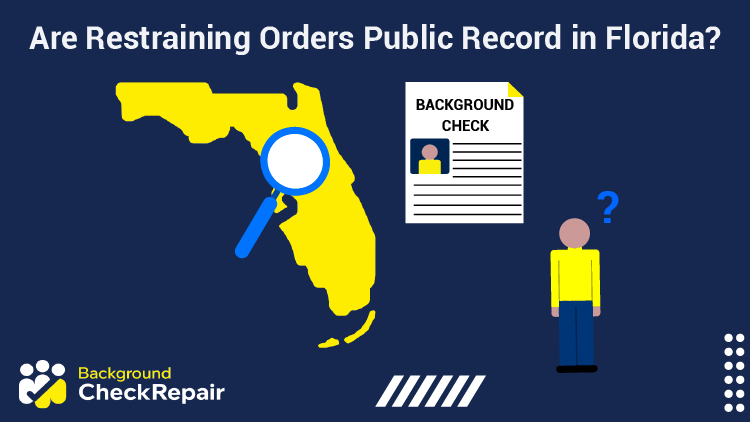
Table of Contents
Are restraining orders public record in Florida?
For those living in the sunshine state, although they may have heard about Florida’s protection order search process, finding these records is fairly difficult.
The majority of restraining orders in Florida are filed in civil court, which makes them fairly difficult to access in most cases. However, there is a lot to consider when trying to figure out how a restraining order will impact someone’s life.
This complete guide answers the question, are restraining orders public record in Florida, how to perform criminal history searches in the state, how to file for protection with the courts, and how anyone can perform a protection order search.
When it comes to are restraining orders public record in Florida, the answer will primarily depend on where the restraining order was filed.
In general, most restraining orders or injunctions as they are known in Florida are filed in civil or family court.7 This poses some interesting obstacles when it comes to obtaining the records and learning about the details of someone else’s restraining order.
Although the freedom of information act makes all court records publicly available, there are exceptions to this.8
The FOIA requires all court records that are in the public interest to be available, this idea of public interest is what affects the availability of court records regarding restraining orders. Although criminal records are clearly in the public interest, since those living in a community have a right to know about criminal issues since their personal safety is at stake, not all civil court records are in the public interest.
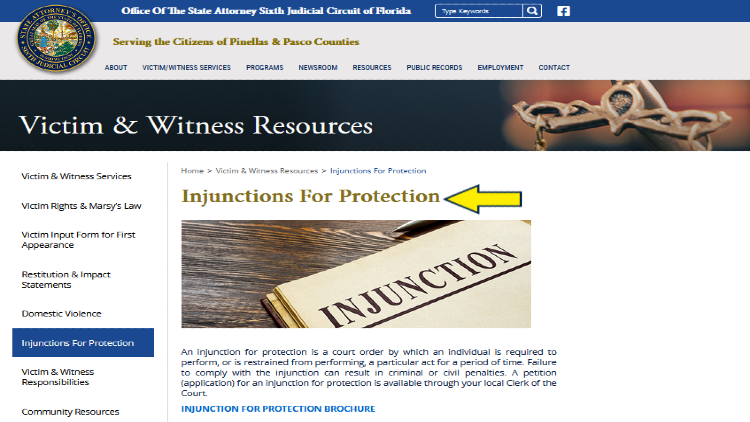
Every district court in the state provides information on how to file for an order of protection in Florida, typically under a court-ordered injunction.
Much of the information in civil court records is highly personal and would not affect the general public. Since this information could potentially have a fairly large negative impact on those involved in the case, and because the benefit of the community being able to access this information would be minimal, most civil court records are sealed immediately.
Since the majority of restraining orders are civil issues and thus filed in civil court, they are usually sealed as soon as they are filed, and therefore the public will not have access to this information.
The notable exception to this is restraining orders that are filed in criminal courts. Some criminal court cases, mainly those involving stalking or domestic violence, will involve a judge filing a restraining order against the perpetrator.5
In this case, records regarding the criminal charges as well as documents pertaining to the restraining order that the judge filed will be made public and can be requested by anybody.
As mentioned, the issue of whether or not a particular restraining order is a public information is somewhat complicated. However, the matter of how to look up restraining orders in Florida is actually quite simple.
Individuals will need to file a records request with the court where the restraining order was filed. Keep in mind that many of these records might be sealed, in which case the records request will be denied unless the requester has a court order, is the individual named in the case, or is the legal representation of the individual in the case.
Detailed steps on how to find restraining order records in Florida are outlined below.
Performing a Florida public records search is extremely easy since so many court records are digitized and available online these days.12
The first thing that individuals will need to do is identify the court where the restraining order was filed, or at least would have been filed if the order exists.
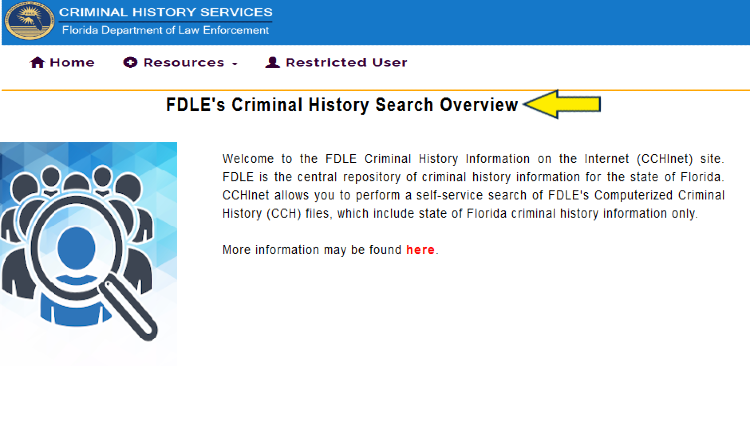
Searching for orders of protection can be done through FDLE’s criminal history search portal, unless the order was filed in civil court, which won’t necessarily appear on a criminal history search.
Once the court has been identified, individuals will need to access the website of the specific court to see if they have an online records request system. Assuming there is an online record system, individuals should be able to find and request records using the name of the individual.
However, having more information such as the case number can be helpful in narrowing the search, especially if the individual has a common name. Individuals will simply need to follow the instructions on the record request system to perform the search, and then a fee will be required to obtain a certified copy of any documents that were found.
Keep in mind that not all Florida counties will have courts that have an online record system. In this case, individuals will need to contact the court clerk directly in order to make a record request.
In most cases, individuals can make the records request by phone, mail, or even via email. Individuals also always have the option to make records requests in person at the courthouse.
The courthouse where the records are held is extremely important, even within the same county the courthouses will only have records of cases filed there.
This means when it comes to the question of, are restraining orders public record in Florida, individuals looking for restraining order records will need to check civil court records and criminal court records to be certain.
The Florida clerk of courts public records is a great resource for all kinds of records, especially when it comes to locating criminal records. Individuals should keep in mind that there is a distinct difference between the local county courts in Florida and the United States District Court in Florida.14
The district court is actually a federal court and will only have records and information regarding federal cases that were heard at that courthouse. Restraining orders are filed at the county level and the records will only be held at the particular county courthouse where the case was filed.
There are tons of other Florida public records that individuals can request if they know which agency to go to. When it comes to free public property records Florida, individuals will need to go through the Florida Department of Environmental Protection in order to make a land or property records request.2
To make a request, individuals will need to go through the DEP business portal.3 Here, individuals can file for requests using the information on the records such as the owner’s name, or by using the map that is provided on the website. Keep in mind that the request will require a fee, and large requests will also be required to pay staffing fees, rather than just copy fees.
Individuals can use the same steps for finding court records to perform a Florida criminal case search.
As mentioned, all local court cases in Florida will only be held at the court where the case was filed, so individuals who are looking for a specific case will need the basic information of the case, such as the case number or the names of the individuals involved in the case, as well as knowledge of which court the case was filed at.
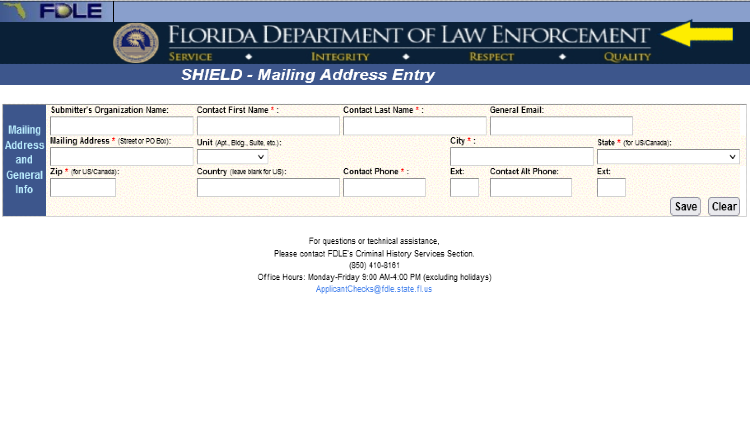
The Florida Department of Law Enforcement allows users to perform criminal background checks using name-based information.
Many individuals who are looking to perform a criminal case search are actually looking for general criminal history information on a specific person. If this is the case, it may be easier to simply go through the Florida Department of Law Enforcement to find this information.10
The FDLE has a detailed guide for how to make a general public records request, as well as information on how to request criminal history information on a specific individual. 9, 11
Performing a Florida deed search is also extremely easy in the state. All property deeds in Florida are maintained by the county clerk in each individual county.
Although some county clerks will have a website dedicated to them where individuals can make a records request, the majority of counties will require individuals to perform a records request by contacting the county clerk directly. In most cases, the search can be completed using the name of the property owner.
Performing a Florida arrest search is slightly more difficult than other public records. The main issue is there is not a single database that will contain all arrest records in the state.
Instead, individuals will need to make individual records request with law enforcement. Based on the circumstances, this may be with the state police, local sheriff’s department, or local police.
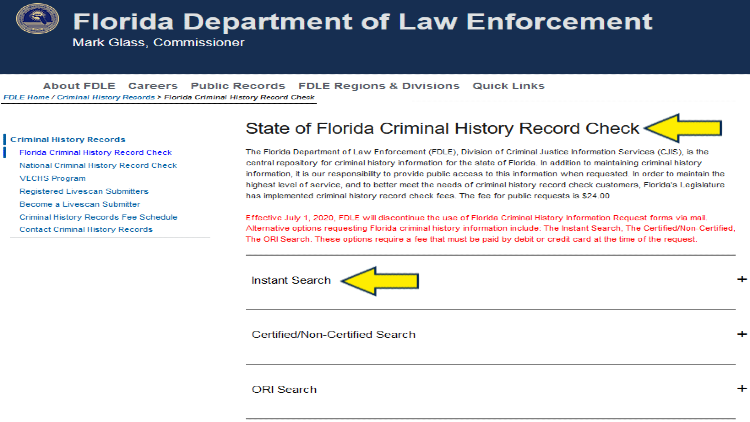
The instant search feature on the FDLE’s website can be done swiftly, but for certified and ORI searches, the process can take a little longer to search.
Individuals should contact the agency directly to see the best way to make a records request, which can often be done over the phone.
When it comes to, does a restraining order goes on your personal record, the main factor that needs to be considered is what court the restraining order was filed in. Although many restraining orders are filed in criminal court, often as part of a case involving a domestic violence charge, the majority of restraining orders are filed in civil court.
Although criminal court records are virtually always publicly available, the same is not true for civil records. The majority of civil court records will be sealed and thus will not appear on an individual’s record.
Many individuals will be wondering, does a harassment order goes on your personal record, and might be surprised by the answer.
The issue of harassment records is similar to restraining orders. Generally, harassment orders will be filed in civil court and thus are unlikely to appear on an individual’s record since the documents will likely be sealed.
Individuals who had a restraining order filed as a result of a criminal case will want to know, how long a restraining order stays on your personal record, and will be worried about how it will affect future job opportunities.
How long a restraining order stays on an individual’s criminal record will depend on state law, specifically, if the individual lives in a state that limits criminal history information to only being accessible for 7-10 years.
If the individual is not in a 10-year state, then the information will remain on their record forever. Florida does not follow the 10-year rule, so individuals can expect their records to remain forever.
In regards to does a temporary restraining order stays on your personal record, the answer is generally no. Temporary restraining orders are used when an individual petitions for a restraining order in civil court, the TRO is intended to protect the individual until the hearing for the final restraining order, which can take several weeks to occur.
Since this is filed in civil court, the information will not appear on an individual’s record.
Performing a restraining order background check is likely the best way to know for certain whether or not restraining order information is on your record. Individuals can perform a background check on themselves using the search bar at the top of this page.
There is also the option to have a federal background check performed on yourself through the FBI which is the most intensive and thorough check available.1
Those wondering, how far back a background check goes in Florida, might be disappointed to find that Florida background checks will go back forever. The only background check-related laws that are followed in Florida are those outlined at the federal level by the FCRA.13
The FCRA does not have any limits on how far back a background check can go when it comes to conviction information.
Those wondering are divorce records open to the public in Florida? will be dismayed to find that a similar issue to restraining order records plagues divorce records in Florida.
Basically, Florida divorce records are technically considered public but are almost always sealed due to the divorce records containing extensive private information.
Many people will be wondering about the way that the Florida public records request law works. This law, also known as the sunshine law, simply requires that all public agencies allow individuals to make records requests.6This is very similar to the freedom of information act but is specific to the state of Florida.
Florida public records request fees vary from agency to agency but are generally less than $20.
Although there is a ton of information in Florida that is considered public and can be requested by anyone, there is also a Florida public records exemption list that individuals might want to look into before making a records request.6
The Florida public records request response time varies from agency to agency and will also change based on the nature of the request. However, simple requests such as court documents will be completed in less than a week in most cases.
The question of, are restraining orders public record in Florida is somewhat complicated. The main thing that individuals should know is that most restraining orders are filed in civil court, and this will not be a public record. However, orders filed in criminal court will be public records.
Not knowing what to expect from a restraining order can be a difficult position to be in. However, by researching local laws individuals can be better prepared and be able to answer questions like are restraining orders public record in Florida?
Florida property records will be available from the county clerk.
A typical public records request will depend on the record, but in most cases the name on the record will be enough to perform the search.
Public records in Florida can only be obtained for a fee.
All public record requests in Florida will require individuals to pay a fee to cover the copying cost at the very least.
The clerk of court will be in charge of all the records for a specific court and is tasked with handling record requests.
A public records request can be completed through the Florida courts or through the local county clerk depending on the record.
Restraining orders are only public record if they were filed in a criminal court.
Individuals will need to contact their local Florida court to learn the best way to search for records.
Florida property records can be searched through the local county clerk.
All court records are considered public and can be requested through the court clerk.
Public records requests in Florida will generally require a fee to obtain a copy.
Florida marriage records can be requested through the states vital records office. 14
Individuals can reach out to the department of health directly with any records requests.
1Federal Bureau of Investigation. (2023). Identity History Summary Checks (Rap Sheets). Federal Bureau of Investigation. Retrieved January 3, 2023, from <https://www.fbi.gov/how-we-can-help-you/more-fbi-services-and-information/identity-history-summary-checks>
2Florida Department of Environmental Protection. (2022, September 19). Title and Land Records. Florida Department of Environmental Protection. Retrieved January 3, 2023, from <https://floridadep.gov/lands/bureau-survey-mapping/content/title-and-land-records>
3Florida Department of Environmental Protection. (2023). Public Home. Florida Board of Trustees Land Document System. Retrieved January 3, 2023, from <https://prodenv.dep.state.fl.us/DslBtlds/public/welcome>
4Florida Department of Health. (2021, March 3). Certificates. Florida Department of Health. Retrieved January 3, 2023, from <https://www.floridahealth.gov/certificates/certificates/>
5The Florida Legislature. (2023). MARRIAGE; DOMESTIC VIOLENCE. Online Sunshine. Retrieved January 3, 2023, from <http://www.leg.state.fl.us/statutes/index.cfm?App_mode=Display_Statute&URL=0700-0799/0741/Sections/0741.30.html>
6The Florida Legislature. (2023). PUBLIC RECORDS. Online Sunshine. Retrieved January 3, 2023, from <http://www.leg.state.fl.us/statutes/index.cfm?App_mode=Display_Statute&URL=0100-0199/0119/0119.html>
7Florida Prosecuting Attorneys Association. (2023). Injunctions For Protection. Office of The State Attorney Sixth Judicial Circuit of Florida. Retrieved January 3, 2023, from <https://www.flsa6.gov/victim-and-witness-resources/injunctions-for-protection/index>
8Office of Information Policy (OIP) U.S. Department of Justice. (2023). The basic function of the Freedom of Information Act is to ensure informed citizens, vital to the functioning of a democratic society. FOIA.gov. Retrieved January 3, 2023, from <https://www.foia.gov/>
9State of Florida. (2021, August 25). FDLE’s Guide to Public Records Requests. Florida Department of Law Enforcement. Retrieved January 3, 2023, from <https://www.fdle.state.fl.us/Open-Government/Documents/FDLEGuidetoPublicRecords.aspx>
10State of Florida. (2023). How can we help you today? Florida Department of Law Enforcement. Retrieved January 3, 2023, from <https://www.fdle.state.fl.us/>
11State of Florida. (2023). Obtaining Criminal History Information. Florida Department of Law Enforcement. Retrieved January 3, 2023, from <http://www.fdle.state.fl.us/Criminal-History-Records/Obtaining-Criminal-History-Information.aspx>
12State of Florida. (2023). Public Records/ Records Custodian. Florida Department of Law Enforcement. Retrieved January 3, 2023, from <https://www.fdle.state.fl.us/OGC/Public-Records.aspx>
13United States Government. (2023). Fair Credit Reporting Act. Federal Trade Commission. Retrieved January 3, 2023, from <https://www.ftc.gov/legal-library/browse/statutes/fair-credit-reporting-act>
14United States Government. (2023). Welcome. United States District Court for the Southern District of Florida. Retrieved January 3, 2023, from <https://www.flsd.uscourts.gov/>
We use cookies to ensure that we give you the best experience on our website. If you continue to use this site we will assume that you are happy with it